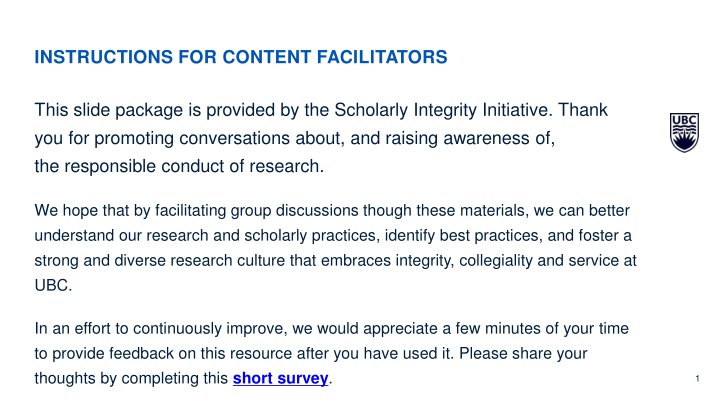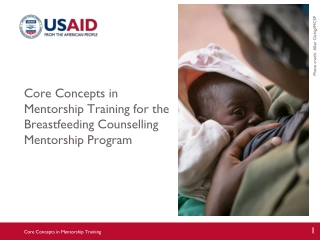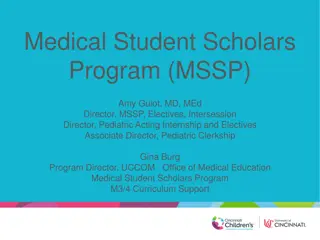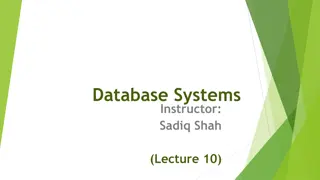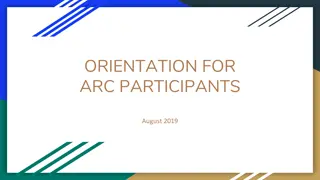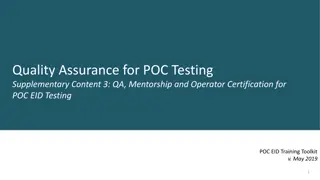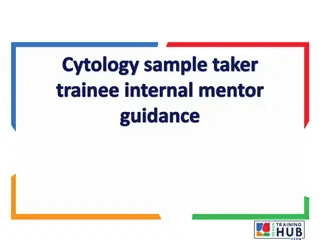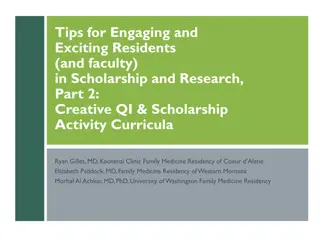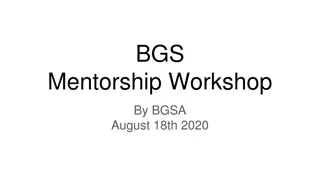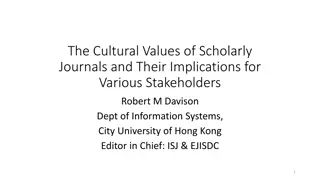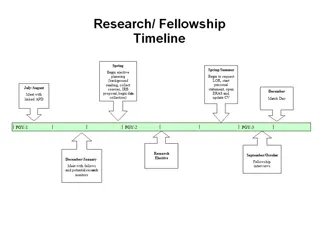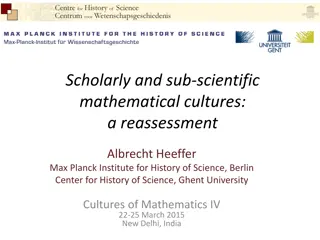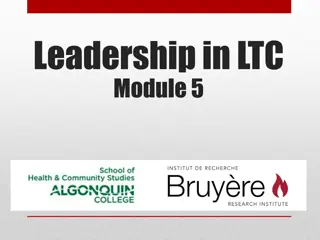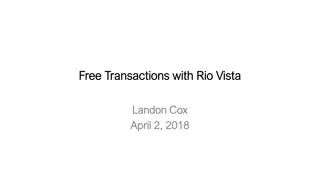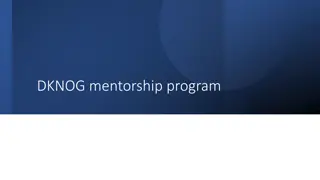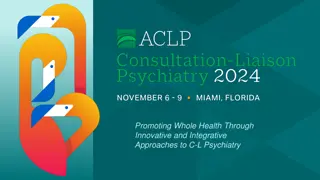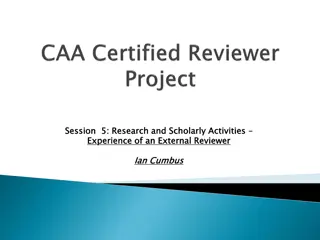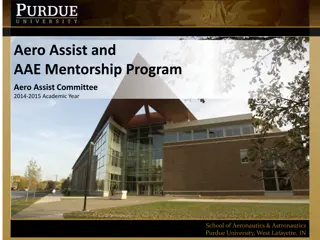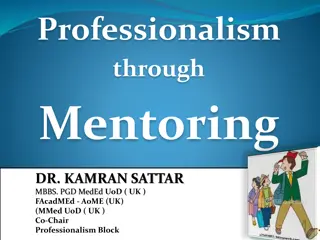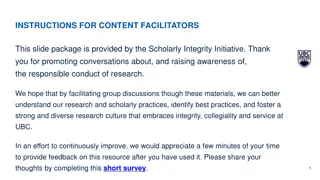Promoting Scholarly Integrity Through Mentorship
This slide package from the Scholarly Integrity Initiative focuses on the roles, responsibilities, and importance of mentorship in research settings. It emphasizes fostering a culture of integrity, trust, and respect to develop competent and independent scholars.
Download Presentation

Please find below an Image/Link to download the presentation.
The content on the website is provided AS IS for your information and personal use only. It may not be sold, licensed, or shared on other websites without obtaining consent from the author.If you encounter any issues during the download, it is possible that the publisher has removed the file from their server.
You are allowed to download the files provided on this website for personal or commercial use, subject to the condition that they are used lawfully. All files are the property of their respective owners.
The content on the website is provided AS IS for your information and personal use only. It may not be sold, licensed, or shared on other websites without obtaining consent from the author.
E N D
Presentation Transcript
INSTRUCTIONS FOR CONTENT FACILITATORS This slide package is provided by the Scholarly Integrity Initiative. Thank you for promoting conversations about, and raising awareness of, the responsible conduct of research. We hope that by facilitating group discussions though these materials, we can better understand our research and scholarly practices, identify best practices, and foster a strong and diverse research culture that embraces integrity, collegiality and service at UBC. In an effort to continuously improve, we would appreciate a few minutes of your time to provide feedback on this resource after you have used it. Please share your thoughts by completing this short survey. 1
HOW TO USE THIS RESOURCE There are two sections to this slide deck resource. 1. The first section is a core slide presentation. Use this to introduce concepts, discuss terminology, and generate discussion with your audience. 2. The second section includes additional slides that you can add to the core presentation, depending on the needs of your audience. Facilitator notes are provided with each slide. Before delivering this material, you should familiarize yourself with the Scholarly Integrity Policy and the relevant scholarly standards within your discipline. If you need additional support, please contact the Scholarly Integrity Initiative. 2
ADAPTING AND SHARING THIS RESOURCE This introductory slide deck is licensed under the Creative Commons Attribution 4.0 International License, which allows you to share and adapt this resource as long as you give appropriate credit, provide a link to the license and indicate if changes were made to the content. For more information about this license, please visit: http://creativecommons.org/licenses/by/4.0/ Please attribute to the Scholarly Integrity Initiative, Office of the Vice-President, Research & Innovation, The University of British Columbia. 3
MENTORING RELATIONSHIPS The Scholarly Integrity Initiative HTTPS://RESPONSIBLE.RESEARCH.UBC.CA
INTRODUCTION What are the roles and responsibilities of a mentor? What are the roles and responsibilities of a mentee? Why is mentorship important? How does it relate to scholarly integrity? 5
A healthy and productive mentor-mentee relationship supports scholarly integrity by: Clarifying the value of conducting research ethically and responsibly Fostering a culture of integrity based on trust, openness and mutual respect Developing a new generation of productive, competent, responsible and independent scholars 6
There are a number of factors that make research mentoring relationships complex. If left unexamined, these factors can also impact how effective these relationships are at promoting the responsible conduct of research. What does this mean for us? 7
WHAT DOES THIS MEAN FOR US? Clarify shared expectations and ways of working together Discuss and agree upon goals and objectives Listen with curiosity and an open mind Seek and/or provide guidance as needed Establish processes for addressing and resolving conflicts Connect with a larger scholarly community What else? 8
SUPPORT & RESOURCES Downloadable Graduate Student Supervisor Expectation Checklist, UBC Okanagan Graduate Student-Supervisor Expectation Form, UBC Vancouver Supervision Template Letter, UBC Vancouver UBC Support Services Principles of Graduate Supervision, Faculty of Graduate & Postdoctoral Studies Handbook of Graduate Supervision, Faculty of Graduate & Postdoctoral Studies Foundations of Career Planning Program, Postdoctoral Fellow Office Relevant Statements & Policies Respectful Environment Statement 9
MENTORSHIP IS A RESPONSIBILITY OF THE COMMUNITY [Mentorship] is a process of interactive, reciprocal, intellectual, and ethical dialogue. It is a process that involves engagement with a community or communities of scholars to support the development of professional judgment and learning to create, transform, and share knowledge. - UBC Graduate Supervision Leadership Group 12
CASE STUDIES 13
The department head strongly believes in the inclusion of diverse perspectives. For this purpose, they frequently request Dr. Nguyen, an untenured junior member of faculty, to serve on university, other academic organizations and departmental committees. Dr. Nguyen feels obligated to say yes to these commitments and their research is suffering. They also feel guilty for not adequately supervising and supporting their graduate students learning because of their many obligations. What are some potential implications of this situation? 14
Prof. Pye is a well-known and well-funded researcher who travels frequently to work with collaborators. As a result, Sam, a graduate student has only infrequent 1:1 meetings with Prof. Pye during their studies. Sam sent a draft research proposal and sought feedback from Prof. Pye. Three months went by before Sam received any feedback. Sam revised and further developed the proposal. After several attempts, Sam finally managed to schedule a meeting with Prof. Pye. Sam was surprised to learn that Prof. Pye was critical about their proposal and encouraged them to pursue a different research direction. What factors contributed to this situation? 15
